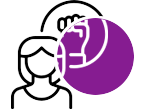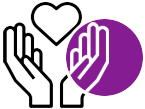
Minimum Wage vs Living Wage - What's The Difference?
Share
Between Oct 17 - 23, it was anti-poverty week. Possibly this week slipped by without much notice, however, as I was reflecting upon that week, I thought it beneficial to write a blog on the difference between a minimum wage and a living wage as quite a number of people are unaware of how much of a difference a living wage would mean to the lives of those living in poverty.
Hunger

Let me start off by asking you a question - How many of you understand poverty? What it feels like to be hungry, truly hungry where your stomach is in knots, begging you to find food? And you're left in tears from the pains of this hunger.
How many of you have to make a daily decision whether you can afford to eat today?
This is the reality faced by millions around the world.
A reality that is so far from our lived experience, we can only imagine what this pain must feel like. The mental and physical strain on the person and their family from the relentless daily struggle just to survive would be enough to crush us all.

The reality is the vast majority of the people in emerging economies who make the products we consume, struggle to survive on wages that are barely enough to cover daily subsistence needs.
The Minimum Wage
The minimum wage is a set legal floor for workers that employers must pay, however, this wage is often set by negotiation between government, industry and sometimes trade unions. There isn't representation of workers, it's not based on community costings - meaning it doesn't take into consideration the actual cost of living and it's not indexed to inflation.
A minimum wage that barely covers daily needs results in workers:-
- Working excessive overtime hours or multiple jobs
- Becoming boned labourers meaning they work to pay off debts but often the terms of debt repayment are not clear and the person who is holding the debt has incredible control over the worker
- Putting their kids to work instead of school
- Struggling to meet basic needs of food, shelter, nutrition, health and education
Globally 700 million people are unable to meet basic daily needs and live on less than US$2 a day

A living Wage
A living wage, on the other hand, allows workers to meet all basic needs, such as food, housing, bills, education, healthcare, clothing and transportation as well as allowing for savings or discretionary income.
Proponents of the living wage argue that a living wage for workers in the global value chain could contribute to supporting families to emerge from conditions of poverty, raising emotional, mental and physical well being and fuelling economic growth.
Just imagine the enormous relief one would feel knowing you and your family can be fed, clothed and have shelter and be able to keep your kids in school.
Makes you think how much we all take for granted.
Findings from a Deloitte paper
In 2017, Deloitte was engaged by Oxfam Australia to conduct an analysis on the overall cost of bringing a garment to Australian consumers if a living wage were instead paid to factory workers.
Their key finding is that
Paying a living wage to factory workers would increase the final garment price by just 1%
Now I know, this is only one type of industry focusing on garments but just imagine that 1% increase in the final price could mean that families earn enough to pay all bills, keep kids in school and have money left over to spend or to save. I would have no issue paying this increase and I'm sure many of you reading this will feel the same way so, why haven't brands demanded a living wage be paid?
Possibly because there just aren't enough of us voting with our wallet and sending a message to the big brands out there that unless you enforce better, fair and equitable working conditions and pay, we will be taking our business elsewhere.
Why Should You or I Care about Poverty?
Turning your back on poverty sends a message to the vulnerable, disadvantaged and marginalised that we don't care about your plight.
Poverty comes in many forms and it has no borders.
It's my belief that your dignity and my dignity is tied to every other human being on Earth.
As we end poverty, true prosperity begins. We'll begin to see everyone's true potential and talents come forward and we will all begin to flourish.
I am so proud to say Karuna Dawn's ethical production partners all pay a living wage and we only partner with ethical production houses that provide employment and opportunity to marginalised and disadvantaged people.
What can I do?
There's a lot that you can do to take action and help lift people from poverty. Here are just a few ideas to get you started.
-
Vote with your wallet. Use your power of choice to support ethical brands
-
Aspire not just to make a living but to make a difference. This could be sponsoring someone's education, volunteering at shelters, donating your time or money to anti-poverty causes
-
Become more empathetic and compassionate. Open your heart to other people's stories. Truly listen to understand and let their words move you to action
-
Don't judge their circumstances or the choices they could or should have made. Seek to understand and then see how you can help
-
Educate yourself and talk to other people in your circles about poverty. Spread awareness that poverty exists not just in remote corners of the 3rd world but, right here in our own backyard
-
See the world and everyone in it as connected to you.The more you see yourself in others, the more you will be able to out stretch your hand. In the most spiritual sense, there is nowhere that you stop and I start or vice versa. Separation is just an illusion and this keeps us from the ultimate reality of oneness. We are all woven from the same thread








